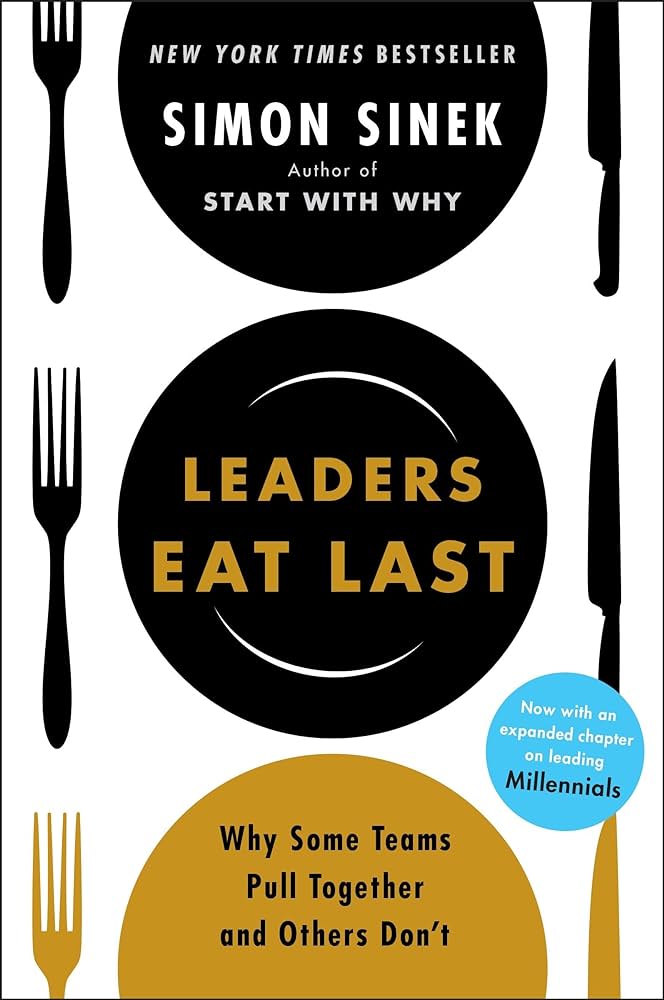Leaders Eat Last delves into the core behaviors and dynamics that define effective leadership. Simon explains that leadership is a choice to serve others, not a position tied to a formal rank. While serving clients and customers is vital, true leadership focuses primarily on the well-being of a team and colleagues. In fact, a well-led team is much better equipped to serve clients and customers.
Savvy leaders grant an appropriate level of control and autonomy regardless of an individual’s level within the organization. This empowerment allows team members to perform at their best and reduces stress. It also shifts the decision making dynamics from requesting permission towards seeking advice.
Great leaders have long-term mindsets that prioritize adhering to a worthy cause. This means they are willing to make short term sacrifices to uphold the cause (think a budget cut or owning a failure), but also seek to absorb most of the impact. This dynamic creates strong mutual trust. Employees trust that decisions are made in the best interest of the company (not just leadership), and in turn, they can be trusted to support the cause wholeheartedly. Cause-driven leaders not only trust employees to follow the rules, but also to know when it’s okay to break them.
This book has reminded me that true leadership goes beyond inspiring and empowering others. I now better understand that that genuine care and selflessness are essential to be an ideal leader.
You should read this book if you…
- want to be a more effective leader
- seek to understand optimal leadership behaviors
- want to connect a long term vision with short term decisions
Additional Information
Year Published: 2014
Book Ranking (from 1-10): 9 – Excellent – Broad and very well articulated insights
Ease of Read (from 1-5): 2 – Quick read
Key Highlights
- These exceptional organizations all have cultures in which the leaders provide cover from above and the people on the ground look out for each other. This is the reason they are willing to push hard and take the kinds of risks they do. And the way any organization can achieve this is with empathy
- When the people have to manage dangers from inside the organization, the organization itself becomes less able to face the dangers from outside
- But the danger inside is controllable and it should be the goal of leadership to set a culture free of danger from each other. And the way to do that is by giving people a sense of belonging. By offering them a strong culture based on a clear set of human values and beliefs. By giving them the power to make decisions
- It is not the demands of the job that cause the most stress, but the degree of control workers feel they have throughout their day. The studies also found that the effort required by a job is not in itself stressful, but rather the imbalance between the effort we give and the reward we feel. Put simply: less control, more stress
- ENDORPHINS SERVE ONE purpose and one purpose only: to mask physical pain. DOPAMINE IS THE reason for the good feeling we get when we find something we’re looking for or do something that needs to get done. SEROTONIN is the feeling of pride. It is the feeling we get when we perceive that others like or respect us. It makes us feel strong and confident. OXYTOCIN IS MOST people’s favorite chemical. It’s the feeling of friendship, love or deep trust
- Leadership is the choice to serve others with or without any formal rank. There are people with authority who are not leaders and there are people at the bottom rungs of an organization who most certainly are leaders
- Trust is not simply a matter of shared opinions. Trust is a biological reaction to the belief that someone has our well-being at heart. Leaders are the ones who are willing to give up something of their own for us. Their time, their energy, their money, maybe even the food off their plate. When it matters, leaders choose to eat last
- We don’t just trust people to obey the rules, we also trust that they know when to break them
- Abundance can be destructive because it abstracts the value of things. The more we have, the less we seem to value what we’ve got
- The more abstract people become, the more capable we are of doing them harm
- As social animals, it is imperative for us to see the actual, tangible impact of our time and effort for our work to have meaning and for us to be motivated to do it even better
- “Long-term greedy” meant that sometimes it was worth taking a short-term hit to help a client because the loyalty and trust it produced would in time pay back
- That’s what the best leaders do. They share what they know, ask knowledgeable people for help performing their duties and make introductions to create new relationships within their networks. Poor leaders hoard these things, falsely believing it is their intelligence, rank or relationships that make them valuable
- What we call “entitlement” could actually be a mismatch between the reality of what Millennials experienced in their youth and what they later experience in the workplace. In the real world, we get nothing for coming in last. Sometimes we don’t even get anything for coming in first
- Step Twelve is the commitment to help another alcoholic beat the disease. Step Twelve is all about service. And it is service that is the key to breaking our dopamine addictions in our organizations too. I’m not talking about serving our customers, employees or shareholders. I’m not talking about abstractions of people. I mean service to the real, living, knowable human beings with whom we work every day
- Responsibility or accountability isn’t about starting a task or a project. It happens when we carry it to completion

Discover more from The Broader Application
Subscribe to get the latest posts sent to your email.
